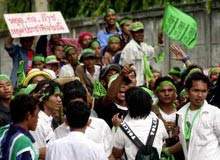
The Trans Thailand Malaysia (TTM) gas pipeline and separation project was instigated in February 2000 to transport and process natural gas from the gas reserves in Malaysia’s joint development area (JDA). The JDA is approximately 255km east of Songkhla Province in the Gulf of Thailand and covers an area of 7,250km². The TTM project consists of the Gas Pipeline Project and the Songkhla Gas Separation Plant (GSP) Project geared to making LPG.
The origins of the project date back to 1979 when the governments of Thailand and Malaysia signed a memorandum agreeing to explore the possibilities of jointly developing the recently found gas reserves in the JDA. The Malaysia-Thailand Joint Authority (MTJA) was established in 1990 to oversee and plan joint activities relating to development of the JDA.
TRANS THAILAND MALAYSIA PIPELINE
Thailand and Malaysia shared the costs of the $2.42 billion, 255km pipeline to transport the gas to Thailand, where it is processed at the new GSP to be built on the coast at Chana. The final stage in the network is a further 93km pipeline extension to the border to link into the Malaysian Peninsular Gas Utilization pipeline at Changlun in Kedah.
The pipeline consists of three offshore and onshore sections. The first section consists of a 55km length, 28in diameter pipeline connecting the offshore block A-18 and block B-17 gas reserves in the JDA.
The second section is 277km long and consists of a 34in diameter offshore gas pipeline designed to withstand 2,080psig (pounds per square inch gauge) pressure with a maximum transmission capacity of 1,020mmscfd (millions of standard cubic feet of gas per day), which is to be laid from block A-18 to the gas separation plant in Songkhla.
The third section of the pipeline will be laid 96.5km overland from the GSP and will connect with the Malaysian PGU III pipeline system (gas grid). This section of the route consists of a 36in diameter pipeline designed to withstand 1,000psig pressure with a maximum transmission capacity of 750MMSCFD.
An eight inch diameter pipeline capable of transmitting 1,166t/day of liquid petroleum gas will also run parallel to the main natural gas pipeline from the gas separation plant to Prai Depot in Malaysia.
The JDA’s gas reserves will last for between 14 and 22 years. The pipes have been designed to have an operational life of at least 40 years to ensure they will be operable for the full length of the project.
BENEFITS OF THE TRANS THAILAND MALAYSIA (TTM) PROJECT
A study team has predicted a return rate on the project of 15-18%, especially if endorsed by the Board of Industry. The construction period (delays accepted) was just over 12 months and required a work force of up to 1,200 people.
Current laws do not permit local government to charge taxes on infrastructure projects. So, if local government organisations are to benefit from the project, a special scheme must be devised. One such scheme involves local government helping to look after the pipeline in return for a percentage of the profits.
LPG AND NATURAL GAS PLANT
Products from the gas separation plant are used for combustion to generate energy or as feed materials for petrochemical industries. The Songkhla GSP was designed to produce mainly liquid petroleum gas and natural gas liquids, which are fuel. There is no indication that other petrochemical industry feed products, such as olefins, aromatics or naphtha are, or will be, produced. As a result, petrochemical industries are unlikely to develop in the project area as a consequence of construction of the gas separation plant. However, industry in general can be expected to benefit from the new source of energy that will be available.
LEAD CONTRACTORS
The production contractors for block A-18, one of three blocks that the JDA is broken up into, are Petronas Carigali (JDA) Sdn Bhd, a wholly-owned subsidiary of Petronas Carigali of Malaysia, and the Triton Oil Company of Thailand, with operations controlled by the Carigali-Triton Operating Company (CTOC). The production contractors for the other two blocks are Petronas Carigali (JDA) Sdn Bhd and PTTEP International Limited, the international arm of the Petroleum Authority of Thailand (PTT), a state-run company.
Petronas and the PTT have agreed on a gas sales and purchase agreement for block A-18 under which each party will buy gas from the JDA on a 50:50 basis and then bring their respective share of gas back to Malaysia and Thailand. Gas purchases from block A-18 are expected to amount to 390 million standard cubic feet per day.
UPDATE AND COMPLETION
The pipeline project was surrounded by controversy with protests from the indigenous Muslim population whose lives would be affected by the pipeline. There were protests from human rights activists urging Barclays Bank (a major lender in the project of $257 million) to withdraw their support from the project. Also, there were allegations of bullying tactics carried out by the Thai and Malay governments to take land they did not own for the project.
Despite these problems, construction on the pipeline started in mid-2003 and was completed in 2006-2007 (some rerouting was necessary to quell protests).Saipem was awarded a contract to construct a 50km section in mid-2006.
The gas separation plant was a different matter. As disputes arose over land, the delays dragged on. As of 2007, the gas separation plant has been operational. In 2004, Telvent – a subsidiary of Abengoa – was awarded a contract for the Trans Thai-Malaysian (TTM) pipeline and gas separation plant project to provide their OASyS DNA SCADA system for gas control and measurement.
Egat have stated that they will build a 700MW gas-fired power plant in the Chana district near the new GSP. This is due to begin construction in 2008 and will use gas from the Malaysia-Thailand Joint Development Area (JDA). Whether or not this will go ahead depends on market demands.

